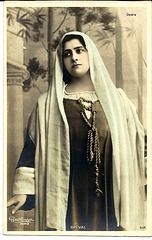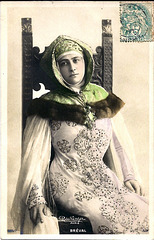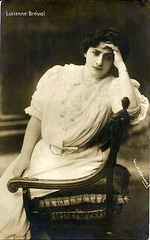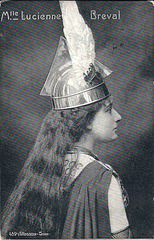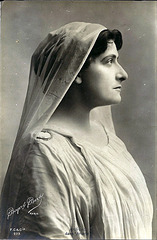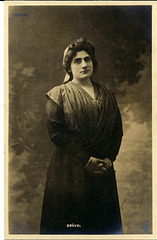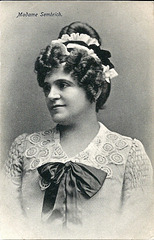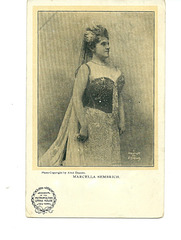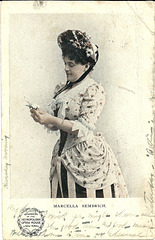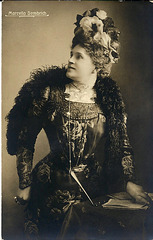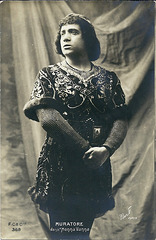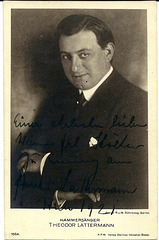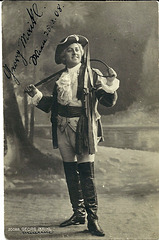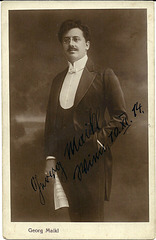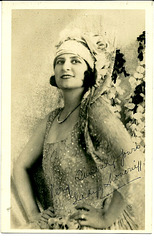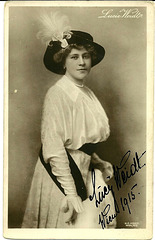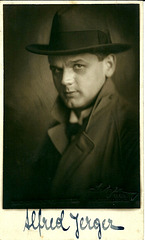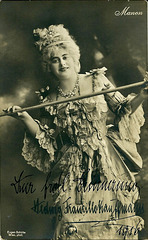
Opera's Golden Age In Postcards
Lucienne Breval
| |
|
Breval as Griseldis "Griseldis" Massenet
CREATOR Opera Comique 20/11/1901
LUCIENNE BREVAL
(Bertha Agnès Lisette Schilling)
(4 November 1869, Zürich- 15 August 1935, Neuilly-sur-Seine)
Swiss Soprano
She studied voice with Victor Warot at the Paris Conservatoire before making her debut at the Opéra National de Paris in 1892 as Selika in l'Africaine by Giacomo Meyerbeer .Bréval became a principal soprano at the Paris Opéra and remained there until 1919.[3] Her roles with the company included several world premières including Augusta Holmès's La Montagne Noire (1895), Camille Erlanger's Le fils de l' étoile' (1904), Dukas’ Ariane et Barbe-bleue (1907), Massenet's Bacchus (1909), and the title roles in Massenet's Ariane (1906) and Henry Février’s Monna Vanna (1909). She also was Kundry in France's first performance of Wagner's Parsifal (1914). Her other notable roles at the Paris Opera included Brünnhilde in Richard Wagner's Die Walküre (1893), Venus in Wagner's Tannhäuser (1895), Marguerite in Hector Berlioz's La damnation de Faust (1897), and the title role in Rameau's Hippolyte et Aricie (1908).
Bréval also occasionally appeared in productions at the Opéra-Comique in Paris. Most notably she portrayed the title role in the world premiere of Massenet’s Grisélidis in 1901, and in 1910 she sang Lady Macbeth in the première of Ernst Bloch’s Macbeth, which he dedicated to her.
In 1899, Bréval made her first appearance at the Royal Opera, Covent Garden as Valentine in Meyerbeer's Les Huguenots. Two years later she made her American début at the Metropolitan Opera as Chimène in Le Cid, singing also in Die Walküre and the American première of Ernest Reyer’s Salammbô. Five years later she returned to Covent Garden for the second and last time in the title role of Gluck’s Armide. In 1913 she created the title role in Fauré’s Pénélope at the Opéra de Monte-Carlo; her other title roles there had been in Isidore De Lara's Amy Robsart and in Bizet's Carmen
Lucienne Breval
| |
|
Breval as Griseldis "Griseldis" Massenet
CREATOR Opera Comique 20/11/1901
LUCIENNE BREVAL
(Bertha Agnès Lisette Schilling)
(4 November 1869, Zürich- 15 August 1935, Neuilly-sur-Seine)
Swiss Soprano
She studied voice with Victor Warot at the Paris Conservatoire before making her debut at the Opéra National de Paris in 1892 as Selika in l'Africaine by Giacomo Meyerbeer .Bréval became a principal soprano at the Paris Opéra and remained there until 1919.[3] Her roles with the company included several world premières including Augusta Holmès's La Montagne Noire (1895), Camille Erlanger's Le fils de l' étoile' (1904), Dukas’ Ariane et Barbe-bleue (1907), Massenet's Bacchus (1909), and the title roles in Massenet's Ariane (1906) and Henry Février’s Monna Vanna (1909). She also was Kundry in France's first performance of Wagner's Parsifal (1914). Her other notable roles at the Paris Opera included Brünnhilde in Richard Wagner's Die Walküre (1893), Venus in Wagner's Tannhäuser (1895), Marguerite in Hector Berlioz's La damnation de Faust (1897), and the title role in Rameau's Hippolyte et Aricie (1908).
Bréval also occasionally appeared in productions at the Opéra-Comique in Paris. Most notably she portrayed the title role in the world premiere of Massenet’s Grisélidis in 1901, and in 1910 she sang Lady Macbeth in the première of Ernst Bloch’s Macbeth, which he dedicated to her.
In 1899, Bréval made her first appearance at the Royal Opera, Covent Garden as Valentine in Meyerbeer's Les Huguenots. Two years later she made her American début at the Metropolitan Opera as Chimène in Le Cid, singing also in Die Walküre and the American première of Ernest Reyer’s Salammbô. Five years later she returned to Covent Garden for the second and last time in the title role of Gluck’s Armide. In 1913 she created the title role in Fauré’s Pénélope at the Opéra de Monte-Carlo; her other title roles there had been in Isidore De Lara's Amy Robsart and in Bizet's Carmen
Lucienne Breval
| |
|
LUCIENNE BREVAL
(Bertha Agnès Lisette Schilling)
(4 November 1869, Zürich- 15 August 1935, Neuilly-sur-Seine)
Swiss Soprano
She studied voice with Victor Warot at the Paris Conservatoire before making her debut at the Opéra National de Paris in 1892 as Selika in l'Africaine by Giacomo Meyerbeer .Bréval became a principal soprano at the Paris Opéra and remained there until 1919.[3] Her roles with the company included several world premières including Augusta Holmès's La Montagne Noire (1895), Camille Erlanger's Le fils de l' étoile' (1904), Dukas’ Ariane et Barbe-bleue (1907), Massenet's Bacchus (1909), and the title roles in Massenet's Ariane (1906) and Henry Février’s Monna Vanna (1909). She also was Kundry in France's first performance of Wagner's Parsifal (1914). Her other notable roles at the Paris Opera included Brünnhilde in Richard Wagner's Die Walküre (1893), Venus in Wagner's Tannhäuser (1895), Marguerite in Hector Berlioz's La damnation de Faust (1897), and the title role in Rameau's Hippolyte et Aricie (1908).
Bréval also occasionally appeared in productions at the Opéra-Comique in Paris. Most notably she portrayed the title role in the world premiere of Massenet’s Grisélidis in 1901, and in 1910 she sang Lady Macbeth in the première of Ernst Bloch’s Macbeth, which he dedicated to her.
In 1899, Bréval made her first appearance at the Royal Opera, Covent Garden as Valentine in Meyerbeer's Les Huguenots. Two years later she made her American début at the Metropolitan Opera as Chimène in Le Cid, singing also in Die Walküre and the American première of Ernest Reyer’s Salammbô. Five years later she returned to Covent Garden for the second and last time in the title role of Gluck’s Armide. In 1913 she created the title role in Fauré’s Pénélope at the Opéra de Monte-Carlo; her other title roles there had been in Isidore De Lara's Amy Robsart and in Bizet's Carmen
Lucienne Breval
| |
|
Breval as Brunhilde "Die Walkure" Wagner
LUCIENNE BREVAL
(Bertha Agnès Lisette Schilling)
(4 November 1869, Zürich- 15 August 1935, Neuilly-sur-Seine)
Swiss Soprano
She studied voice with Victor Warot at the Paris Conservatoire before making her debut at the Opéra National de Paris in 1892 as Selika in l'Africaine by Giacomo Meyerbeer .Bréval became a principal soprano at the Paris Opéra and remained there until 1919.[3] Her roles with the company included several world premières including Augusta Holmès's La Montagne Noire (1895), Camille Erlanger's Le fils de l' étoile' (1904), Dukas’ Ariane et Barbe-bleue (1907), Massenet's Bacchus (1909), and the title roles in Massenet's Ariane (1906) and Henry Février’s Monna Vanna (1909). She also was Kundry in France's first performance of Wagner's Parsifal (1914). Her other notable roles at the Paris Opera included Brünnhilde in Richard Wagner's Die Walküre (1893), Venus in Wagner's Tannhäuser (1895), Marguerite in Hector Berlioz's La damnation de Faust (1897), and the title role in Rameau's Hippolyte et Aricie (1908).
Bréval also occasionally appeared in productions at the Opéra-Comique in Paris. Most notably she portrayed the title role in the world premiere of Massenet’s Grisélidis in 1901, and in 1910 she sang Lady Macbeth in the première of Ernst Bloch’s Macbeth, which he dedicated to her.
In 1899, Bréval made her first appearance at the Royal Opera, Covent Garden as Valentine in Meyerbeer's Les Huguenots. Two years later she made her American début at the Metropolitan Opera as Chimène in Le Cid, singing also in Die Walküre and the American première of Ernest Reyer’s Salammbô. Five years later she returned to Covent Garden for the second and last time in the title role of Gluck’s Armide. In 1913 she created the title role in Fauré’s Pénélope at the Opéra de Monte-Carlo; her other title roles there had been in Isidore De Lara's Amy Robsart and in Bizet's Carmen
Lucienne Breval
| |
|
Breval as Ariane "Ariane" Massenet CREATOR Palais Garnier 31/10/1906
LUCIENNE BREVAL
(Bertha Agnès Lisette Schilling)
(4 November 1869, Zürich- 15 August 1935, Neuilly-sur-Seine)
Swiss Soprano
She studied voice with Victor Warot at the Paris Conservatoire before making her debut at the Opéra National de Paris in 1892 as Selika in l'Africaine by Giacomo Meyerbeer .Bréval became a principal soprano at the Paris Opéra and remained there until 1919.[3] Her roles with the company included several world premières including Augusta Holmès's La Montagne Noire (1895), Camille Erlanger's Le fils de l' étoile' (1904), Dukas’ Ariane et Barbe-bleue (1907), Massenet's Bacchus (1909), and the title roles in Massenet's Ariane (1906) and Henry Février’s Monna Vanna (1909). She also was Kundry in France's first performance of Wagner's Parsifal (1914). Her other notable roles at the Paris Opera included Brünnhilde in Richard Wagner's Die Walküre (1893), Venus in Wagner's Tannhäuser (1895), Marguerite in Hector Berlioz's La damnation de Faust (1897), and the title role in Rameau's Hippolyte et Aricie (1908).
Bréval also occasionally appeared in productions at the Opéra-Comique in Paris. Most notably she portrayed the title role in the world premiere of Massenet’s Grisélidis in 1901, and in 1910 she sang Lady Macbeth in the première of Ernst Bloch’s Macbeth, which he dedicated to her.
In 1899, Bréval made her first appearance at the Royal Opera, Covent Garden as Valentine in Meyerbeer's Les Huguenots. Two years later she made her American début at the Metropolitan Opera as Chimène in Le Cid, singing also in Die Walküre and the American première of Ernest Reyer’s Salammbô. Five years later she returned to Covent Garden for the second and last time in the title role of Gluck’s Armide. In 1913 she created the title role in Fauré’s Pénélope at the Opéra de Monte-Carlo; her other title roles there had been in Isidore De Lara's Amy Robsart and in Bizet's Carmen
Lucienne Breval
| |
|
Breval as Vita " L'Estranger" d'Indy
LUCIENNE BREVAL
(Bertha Agnès Lisette Schilling)
(4 November 1869, Zürich- 15 August 1935, Neuilly-sur-Seine)
Swiss Soprano
She studied voice with Victor Warot at the Paris Conservatoire before making her debut at the Opéra National de Paris in 1892 as Selika in l'Africaine by Giacomo Meyerbeer .Bréval became a principal soprano at the Paris Opéra and remained there until 1919.[3] Her roles with the company included several world premières including Augusta Holmès's La Montagne Noire (1895), Camille Erlanger's Le fils de l' étoile' (1904), Dukas’ Ariane et Barbe-bleue (1907), Massenet's Bacchus (1909), and the title roles in Massenet's Ariane (1906) and Henry Février’s Monna Vanna (1909). She also was Kundry in France's first performance of Wagner's Parsifal (1914). Her other notable roles at the Paris Opera included Brünnhilde in Richard Wagner's Die Walküre (1893), Venus in Wagner's Tannhäuser (1895), Marguerite in Hector Berlioz's La damnation de Faust (1897), and the title role in Rameau's Hippolyte et Aricie (1908).
Bréval also occasionally appeared in productions at the Opéra-Comique in Paris. Most notably she portrayed the title role in the world premiere of Massenet’s Grisélidis in 1901, and in 1910 she sang Lady Macbeth in the première of Ernst Bloch’s Macbeth, which he dedicated to her.
In 1899, Bréval made her first appearance at the Royal Opera, Covent Garden as Valentine in Meyerbeer's Les Huguenots. Two years later she made her American début at the Metropolitan Opera as Chimène in Le Cid, singing also in Die Walküre and the American première of Ernest Reyer’s Salammbô. Five years later she returned to Covent Garden for the second and last time in the title role of Gluck’s Armide. In 1913 she created the title role in Fauré’s Pénélope at the Opéra de Monte-Carlo; her other title roles there had been in Isidore De Lara's Amy Robsart and in Bizet's Carmen
Marcella Sembrich
| |
|
Sembrich as Mimi "La Boheme" Puccini
MARCELLA SEMBRICH
(Prakseda Marcelina Kochańska)
(February 15, 1858 – January 11, 1935)
Polish Soprano
She entered the Vienna Conservatory in Autumn 1875. It was only then that her remarkable voice was discovered. She studied violin with Joseph Hellmesberger, Sr., piano with Julius Epstein, and voice with Viktor Rokitansky. After a year it was decided to give up study of the violin and piano and fully devote the young student to voice lessons. She arrived in Milan in September 1876 to study with one of the best vocal teachers on the continent, namely, Giovanni Battista Lamperti, son of the eminent teacher Francesco Lamperti, with whom she would later study in 1885.
Made her debut in opera at Athens as Elvira in Bellini's I Puritani on June 3, 1877. She not only sang Puritani, but also Dinorah, Lucia di Lammermoor, Robert le Diable and La Sonnambula! She continued her vocal studies, this time with Marie Seebach and Richard Lewey in Vienna. At Covent Garden and signed a contract there for five seasons. In June 1880 she created a sensation in her debut at Covent Garden as Lucia in Donizetti's Lucia di Lammermoor. She became a great favorite in the characters of Zerlina, Don Giovanni; Susanna, The Marriage of Figaro; Konstanze, The Abduction from the Seraglio; Lady Harriet/Martha, Martha; and, of course, Lucia. She made her Met debut as Lucia in the company premiere of Lucia di Lammermoor on October 24, 1883, she was also the Met's first Elvira in I Puritani, Violetta in La Traviata, Amina in La Sonnambula, Gilda in Rigoletto, Marguerite in Les Huguenots and Rosina in Il Barbiere di Siviglia.
Marcella Sembrich
| |
|
Sembrich as Queen of the Night "Magic Flute" Mozart
MARCELLA SEMBRICH
(Prakseda Marcelina Kochańska)
(February 15, 1858 – January 11, 1935)
Polish Soprano
She entered the Vienna Conservatory in Autumn 1875. It was only then that her remarkable voice was discovered. She studied violin with Joseph Hellmesberger, Sr., piano with Julius Epstein, and voice with Viktor Rokitansky. After a year it was decided to give up study of the violin and piano and fully devote the young student to voice lessons. She arrived in Milan in September 1876 to study with one of the best vocal teachers on the continent, namely, Giovanni Battista Lamperti, son of the eminent teacher Francesco Lamperti, with whom she would later study in 1885.
Made her debut in opera at Athens as Elvira in Bellini's I Puritani on June 3, 1877. She not only sang Puritani, but also Dinorah, Lucia di Lammermoor, Robert le Diable and La Sonnambula! She continued her vocal studies, this time with Marie Seebach and Richard Lewey in Vienna. At Covent Garden and signed a contract there for five seasons. In June 1880 she created a sensation in her debut at Covent Garden as Lucia in Donizetti's Lucia di Lammermoor. She became a great favorite in the characters of Zerlina, Don Giovanni; Susanna, The Marriage of Figaro; Konstanze, The Abduction from the Seraglio; Lady Harriet/Martha, Martha; and, of course, Lucia. She made her Met debut as Lucia in the company premiere of Lucia di Lammermoor on October 24, 1883, she was also the Met's first Elvira in I Puritani, Violetta in La Traviata, Amina in La Sonnambula, Gilda in Rigoletto, Marguerite in Les Huguenots and Rosina in Il Barbiere di Siviglia.
Marcella Sembrich
| |
|
MARCELLA SEMBRICH
(Prakseda Marcelina Kochańska)
(February 15, 1858 – January 11, 1935)
Polish Soprano
She entered the Vienna Conservatory in Autumn 1875. It was only then that her remarkable voice was discovered. She studied violin with Joseph Hellmesberger, Sr., piano with Julius Epstein, and voice with Viktor Rokitansky. After a year it was decided to give up study of the violin and piano and fully devote the young student to voice lessons. She arrived in Milan in September 1876 to study with one of the best vocal teachers on the continent, namely, Giovanni Battista Lamperti, son of the eminent teacher Francesco Lamperti, with whom she would later study in 1885.
Made her debut in opera at Athens as Elvira in Bellini's I Puritani on June 3, 1877. She not only sang Puritani, but also Dinorah, Lucia di Lammermoor, Robert le Diable and La Sonnambula! She continued her vocal studies, this time with Marie Seebach and Richard Lewey in Vienna. At Covent Garden and signed a contract there for five seasons. In June 1880 she created a sensation in her debut at Covent Garden as Lucia in Donizetti's Lucia di Lammermoor. She became a great favorite in the characters of Zerlina, Don Giovanni; Susanna, The Marriage of Figaro; Konstanze, The Abduction from the Seraglio; Lady Harriet/Martha, Martha; and, of course, Lucia. She made her Met debut as Lucia in the company premiere of Lucia di Lammermoor on October 24, 1883, she was also the Met's first Elvira in I Puritani, Violetta in La Traviata, Amina in La Sonnambula, Gilda in Rigoletto, Marguerite in Les Huguenots and Rosina in Il Barbiere di Siviglia.
Marcella Sembrich
| |
|
MARCELLA SEMBRICH
(Prakseda Marcelina Kochańska)
(February 15, 1858 – January 11, 1935)
Polish Soprano
She entered the Vienna Conservatory in Autumn 1875. It was only then that her remarkable voice was discovered. She studied violin with Joseph Hellmesberger, Sr., piano with Julius Epstein, and voice with Viktor Rokitansky. After a year it was decided to give up study of the violin and piano and fully devote the young student to voice lessons. She arrived in Milan in September 1876 to study with one of the best vocal teachers on the continent, namely, Giovanni Battista Lamperti, son of the eminent teacher Francesco Lamperti, with whom she would later study in 1885.
Made her debut in opera at Athens as Elvira in Bellini's I Puritani on June 3, 1877. She not only sang Puritani, but also Dinorah, Lucia di Lammermoor, Robert le Diable and La Sonnambula! She continued her vocal studies, this time with Marie Seebach and Richard Lewey in Vienna. At Covent Garden and signed a contract there for five seasons. In June 1880 she created a sensation in her debut at Covent Garden as Lucia in Donizetti's Lucia di Lammermoor. She became a great favorite in the characters of Zerlina, Don Giovanni; Susanna, The Marriage of Figaro; Konstanze, The Abduction from the Seraglio; Lady Harriet/Martha, Martha; and, of course, Lucia. She made her Met debut as Lucia in the company premiere of Lucia di Lammermoor on October 24, 1883, she was also the Met's first Elvira in I Puritani, Violetta in La Traviata, Amina in La Sonnambula, Gilda in Rigoletto, Marguerite in Les Huguenots and Rosina in Il Barbiere di Siviglia.
Lucien Muratore
| |
|
Muratore as Prinzivalle "Monna Vanna" by Février CREATOR ROLE Palais Garnier Paris 10/1/1909
LUCIEN MURATORE
1878-1954
French Tenor
Studied at the Paris Music Conservatory, and made his operatic debut in 1902, at the Opéra-Comique opposite Emma Calve , creating the King in Reynaldo Hahn's La carmélite.Debut at La Monnaie in 1904, as Werther, and the following year at the Palais Garnier, as Renaud in Lully
Created several Massenet operas such as Ariane and Bacchus, at the Opéra, and Roma, in Monte Carlo. He also took part in the creation of La Catalane by Le Borne, Monna Vanna by Henry Février, Déjanire by Camille Saint-Saëns, and Pénélope by Gabriel Fauré.
He became principal French tenor with the Boston Opera Company, the Chicago Grand Opera Company (1913–1914), the Chicago Opera Association (1915–1921), and the Chicago Civic Opera (1922). He also appeared at the Teatro Colón in Buenos Aires.
Muratore retired from the stage in 1931. Returned to Paris and was made Director of Opera Comique
Theodor Lattermann AUTOGRAHED
| |
|
THOEDOR LATTERMANN
1886-1929
German Bass-Baritone
Studied in Frankfurt with Andreas Dippel . Debut at Barman in 1907 .In 1908he became a member of the Hamburg Opera and remained until his death.Sang Gurnemanz 'Parsifal" in the Hamburg premiere.Made guest appearances in Berlin,Cologne, Amsterdam , Brussels, Vienna . He and his wife contralto Ottilie Metzger made an extensive tour of North America 1922-1924 .He also sang in New York and Chicago. Roles included Teramund "Lohengrin" , Figaro 'the Marriage of Figaro"
Georg Maikl AUTOGRAPHED
| |
|
GEORG MAIKL
1872-1951
Austrian Tenot
Studied in Stuttgart with Anton Mromada, Debut 1899 at Mannheim as Tamino "The Magic Flute" .In 1904 he was appointed to the Vienna Court opera where he remained for the next 40 years.He sang at the Salzburg Festival's.His roles include Tamino /Belmonte 'The Magic Flute" , Brighella "Ariadne & Naxos" , Vogelsang "Die Meistersanger" , Aegisthus "Elektra".
Georg Maikl AUTOGRAPHED
| |
|
GEORG MAIKL
1872-1951
Austrian Tenot
Studied in Stuttgart with Anton Mromada, Debut 1899 at Mannheim as Tamino "The Magic Flute" .In 1904 he was appointed to the Vienna Court opera where he remained for the next 40 years.He sang at the Salzburg Festival's.His roles include Tamino /Belmonte 'The Magic Flute" , Brighella "Ariadne & Naxos" , Vogelsang "Die Meistersanger" , Aegisthus "Elektra".
Gladys Moncrieff AUTOGRAPHED
| |
|
GLADYS MONCRIEFF OBE
1892 – 1976
Australian Soprano
Moncieff was so successful in musical theatre and that she became known as 'Australia's Queen of Song' and 'Our Glad'.
Her first stage performance was at the age of six at the Queen's Theatre in Bundaberg, where she sang the American folk song "The Merriest Girl That's Out" with her father accompanying on piano.] She performed in Gilbert and Sullivan productions.Moncrieff toured South Africa and New Zealand as a leading lady in numerous productions. When she returned to Australia she landed her most famous role as Teresa in Harold Fraser-Simson's light opera The Maid of the Mountains, which she first performed in Melbourne in 1921.The waltz song "Love Will Find a Way" became particularly associated with her. The Maid was to become the most frequently revived musical of the Australian stage, and Moncrieff appeared in it some 2,800 times. She also was a success in A Southern Maid in 1923. She returned to perform in musical comedy, and was engaged to entertain Australian troops fighting in the Second World War at home and in New Guinea, and she became very active raising funds for war-related charities. In 1951 she toured Japan and Korea to entertain British and Australian occupation forces. For her wartime contributions, she was created an Officer of the Order of the British Empire in 1952.
She continued her stage and radio work, and during 1958 and 1959 began her farewell stage tour of Australia and New Zealand. Her final stage appearance was at Hamilton, New Zealand, and her last public performance was in a televised concert in Brisbane in 1962. She retired to the Gold Coast in 1968
Lucy Weidt AUTOGRAPHED
| |
|
LUCY WEIDT
(Marie Louise Charlotta Weidt.)
1876-1940
German Soprano
Studied with Papier-Paumgartner.Soprano at the Vienna Hofoper for the better part of a quarter of a century. Lucie Weidt’s career was no provincial affair by any means. In Vienna and made her operatic début at Leipzig in 1900. Elisabeth in Tannhäuser was her Vienna début rôle in 1902. While the Hofoper remained the center of her activities until her retirement in 1926, Weidt’s remarkable dramatic soprano voice led to engagements in Paris, Milan, Amsterdam, Brussels, Buenos Aires and New York. The Marschallin and Kundry were generally regarded as her finest interpretations. In 1919 she created to role of "The Nurse" (Amme) in Die Frau ohne Schatten. After retirement, she taught in Vienna and resided there till her death.
Alfred Jerger AUTOGRAPHED
| |
|
ALFRED JERGER
1889-1976
Austrian Bass-baritone
He studied at the Academy of Music in Vienna.In Zurich in 1917 his debut as a baritone. In 1919 he came through the mediation of Richard Strauss at the Munich State Opera . In 1921 he became a member of the Vienna State Opera , where he worked until 1953. Jerger worked here not only as a singer but also as an opera director .On 1 July 1933 he sang in the Semperoper as Mandryka in the world premiere of Richard Strauss' Arabella
Hedwig Francillo-Kauffmann AUTOGRAPHED
| |
|
As Manon
HEDWIG FRANCILLO-KAUFFMANN
1878-1948
Austrian Soprano
Studied with Franzi Müller and Emilie Dorr in Vienna, then by Aglaia of Orgeni in Dresden and Maestro Rosario in Milan. Debut in 1898 at the Municipal Theatre of Szczecin.She sang 1899-1902 at the Court Theatre of Wiesbaden, 1902-03 at the Court Opera in Munich, 1903-05 at the Berlin Court Opera. 1905-07 great success at the Komische Oper Berlin. 1907-08 she sang again at the Court Opera Berlin;In 1908 at the Vienna Court Opera, where she worked with brilliant successes until 1912. 1912-1917 she sang at the Opera House of Hamburg. After 1917, she made guest performances and concerts which took her to Vienna, Berlin, Brussels, Paris, London and Munich, but also to South America. In 1927 she gave up her career as a teacher and lived in Berlin and then Vienna
Jump to top
RSS feed- Latest items - Subscribe to the latest items added to this album
- ipernity © 2007-2024
- Help & Contact
|
Club news
|
About ipernity
|
History |
ipernity Club & Prices |
Guide of good conduct
Donate | Group guidelines | Privacy policy | Terms of use | Statutes | In memoria -
Facebook
Twitter

